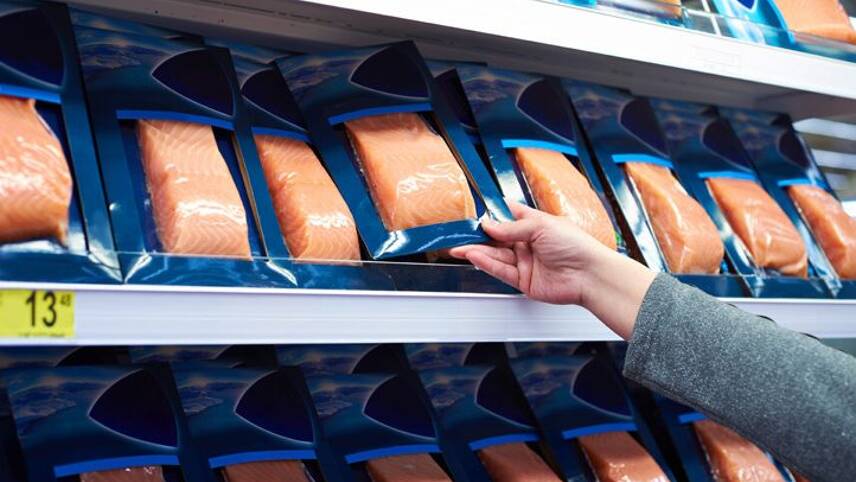Register for free and continue reading
Join our growing army of changemakers and get unlimited access to our premium content

This is because fish farms use wild fish to feed farmed fish, and lots of it: every year, billions of fish – 20% of global catches – are taken from the wild for use in the booming aquaculture industry and livestock rearing.
Multinational aquaculture companies present fish farming as a way of reducing pressure on wild-caught fisheries and supplying people with affordable food. However, our analysis shows that through its dependence on keystone species such as sardines for feed, fish farming is actually placing an unacceptable burden on our oceans and vulnerable communities in the Global South.
By ignoring this reality and placing their faith in flawed sustainability schemes promoted by feed suppliers, UK retailers are failing to live up to their responsibility to ensure the products they sell don’t endanger natural ecosystems or take food away from people. The good news is that a solution is within their grasp: by using their enormous market power to eliminate the use of wild-caught fish in feed and switch to alternative ingredients and approaches, retailers can help turn this situation around.
Unsustainable Supply Chains
Our report “Caught Out: How UK retailers are tackling the use of wild fish in their aquaculture supply chains”, shows that UK shoppers indirectly consume thousands of tonnes of wild fish by eating farmed seafood fed on fishmeal and fish oil (FMFO). We have calculated that on average, UK shoppers buying the top six farmed fish species in 2019 unknowingly ate a ‘hidden’ 172g of wild fish for every 100g of farmed fish eaten.
FMFO is produced in several locations around the world, mainly in the Global South. In recent years, FMFO factories have mushroomed along the coastline of several West African countries including The Gambia, one of the poorest nations on earth. The species targeted for FMFO production – oily, highly nutritious fish such as sardines and mackerel – are a key source of protein and income for vulnerable communities throughout Africa and Asia and also play a crucial role in marine food webs.
At the start of the COVID-19 lock-down, many people in the UK experienced for the first time in their lives what it means to worry about access to food. However, for millions around the world, these concerns are part of their daily existence. Our research shows that extractive, export-oriented sectors such as the FMFO industry are a big part of the problem.
Last year, we investigated three global FMFO hubs – The Gambia, India and Vietnam – and found widespread evidence of unsustainable fishing to supply feed ingredients for the global market including top UK retailers. In The Gambia, fish processed into FMFO at just one plant accounted for approximately 40% of the country’s total reported catches in 2016, revealing the massive scale of the industry. In Vietnam and India, we found that target fish stocks had collapsed, partly as a result of overfishing for FMFO production, and fishermen were in despair about the future.
As well as being an ecological disaster, the situation we witnessed in all three countries has all the makings of a food security catastrophe as fish catches dwindle and local communities are priced out of the market by FMFO factories. In The Gambia, for example, despite possessing some of the world’s richest fishing grounds, fluctuating populations of bonga fish (also known as shad) which is also used to produce FMFO had driven prices up by 50% – something already keenly felt in the local fish markets our investigation team visited.
Some UK Retailers already taking steps in the right direction
Some UK retailers are already taking welcome steps to de-risk their farmed seafood supply chains and encourage feed manufacturers to move away from using FMFO. For instance, Tesco, Waitrose, Marks & Spencer and Sainsbury’s, are investing (financially or otherwise) in sustainable alternative feed ingredients. This is a promising step in the right direction but on the whole, our report highlights poor performance across the sector. Seven out of the ten companies we surveyed scored less than 30% and not one UK retailer currently has a time-bound target to eliminate farmed seafood fed on wild-caught fish – for retailers to demonstrate they are serious about ocean stewardship that needs to change.
Long before the current global public health crisis struck, the aquaculture industry offered a stark example of the dangers in commoditising staple foods and of how this reduces the health and resilience of vulnerable communities. Retailers must take measures to ensure that the farmed fish they sell is not produced at the expense of fish in the wild or the diets of poor communities in the Global South. Failure to act now to stop companies fishing the feed could have disastrous consequences.
UK supermarkets must phase out the use of FMFO sourced from wild-caught fish in their aquaculture supply chains by 2025 at the latest and commit to offering a wide range of seafood – including a greater diversity of sustainably caught wild fish and farmed seafood that doesn’t rely on wild fish in feed, such as mussels. They must also adopt high standards of transparency and reduce reliance on certification as a proxy for sustainability by developing their own robust and transparent standards for sustainably produced seafood, including farmed seafood.
Author: Natasha Hurley, Campaign Manager, Changing Markets Foundation



Please login or Register to leave a comment.